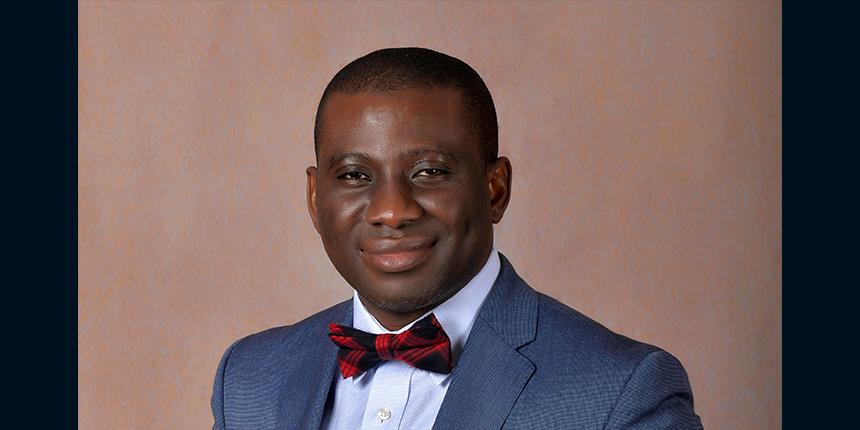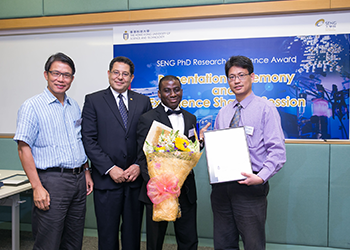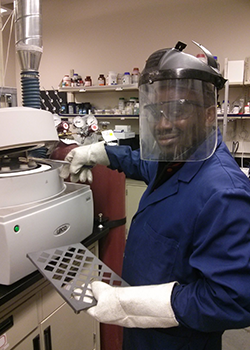

In the world of engineering, sustainability is not just a career path but a mission, one that promotes collaboration and enacts change and action on a global scale. For one research engineer, Adetoyese Oyedun, PhD, P.Eng., this journey began in Nigeria where a passion for engineering and a desire to create change propelled him on a path to drive engineering-driven sustainable solutions.
Early endeavours in engineering and sustainability
From a young age, Oyedun always knew he wanted to be an engineer. Though he acquired a Bachelor of Technology in Industrial Chemistry in his native country, Nigeria, it was a scholarship at Imperial College London that provided him with the opportunity to explore his aspirations of becoming an engineer. The transition from sciences to engineering would lead him to three other continents, setting the stage for a career in waste management and sustainability.
Whether it be from food, water, or energy, Oyedun always disliked waste. It comes as no surprise that while in London, UK, studying a Master of Science in Advanced Chemical Engineering with Process Systems Engineering, Oyedun worked with Yorkshire Water for his master’s project. He spent this time optimizing their sewage sludge logistics within their wastewater treatment plants. His first glimpse into tackling a real-life problem from an engineering perspective, this experience peaked Oyedun’s interest in waste management.
“This project taught me that the importance of optimizing the sewage sludge and waste within the treatment was to reduce the transportation of the waste treatment and greenhouse gas (GHG),” he explains.
Wanting to know more about the impacts of GHG emissions on the environment, Oyedun received another scholarship to pursue more studies in another corner of the world.
Delving into waste management and GHG emissions reduction in Hong Kong

With a newfound curiosity, Oyedun immersed himself into the intricacies of energy conservation and biomass utilization in Hong Kong. Pursuing a PhD in Chemical Engineering with Energy Concentration, his research projects aimed at making the city more sustainable and reducing waste.
Reflecting on his time in Hong Kong, Oyedun recalls, “Hong Kong had a significant amount of bamboo waste, primarily used for scaffolding, at the time. Through my research I sought to understand how bamboo waste and waste tires could be repurposed, contributing to sustainability challenges.”
This was just the beginning of his endeavours in the vibrant, bustling city. Backed with knowledge from his Ph.D, Oyedun collaborated with the Hong Kong Environmental Protection Agency, focusing on reducing emissions and waste burden. “I was deeply inspired by this agency to tackle environmental issues and explore how engineering could make a positive impact,” he shared.
Oyedun emphasizes the critical importance of addressing GHG emissions, stating, “When we increase GHG emission, we elevate the CO2 equivalent in the atmosphere leading to a ripple effect of heightened temperatures and unpredictable weather patterns. This can have severe impacts on the environment and agriculture.”
Venturing to Canada: Leading research initiatives for environmental impact
In 2014, Oyedun relocated to Canada where he continued his mission to tackle real-life challenges surrounding waste management, GHG emissions reduction, and sustainability. In his early days in Canada, he led initiatives in the private and public sectors, making a mark at a provincial and local level. At the University of Alberta, in collaboration with Environment and Climate Change Canada, Oyedun’s project management and research expertise was incorporated into the Clean Fuel Standard (CFS), a legislation implemented in 2022 to reduce carbon emissions by 2030 by 30 million tonnes.

Moving then to working for the Government of Alberta, Oyedun continued his passion for exploring sustainable solutions. With the provincial government, Oyedun worked with a team on advancing bio-economy focusing on the use of renewable sources and reduce the reliance on fossil fuel.
“As Alberta is oil and gas intensive, our work focused on finding ways to incorporate green alternatives in the economy,” he says. “This involved the production of hydrogen, production of biofuel from renewable sources, and reducing GHG emissions burden in the agriculture sector.”
Currently, Oyedun serves as Senior Project Manager, Northern Alberta Institute of Technology (NAIT) Applied Research division, where he oversees research portfolios for the initiatives between NAIT and Heartland Polymers, Inter Pipeline’s polypropylene brand, looks to advance the reuse and recycling of plastic in Canada and beyond. This collaborative effort between NAIT and Heartland Polymers, called Plastics Research in Action (PRIA), is developing solutions to ensure that waste plastics are reused as a valuable resource in the development of other products, while reducing their environmental impact.

In this dynamic and multifaceted role, Oyedun manages timelines, budgets, and resources with researchers and other stakeholders. Serving as research lead for some of the projects within the initiative, he leverages his expertise in chemical engineering and sustainability to help promote resource efficiency, designing sustainable infrastructure to repurpose plastic.
Championing diversity and mentorship in engineering
Beyond Oyedun’s professional pursuits, he champions diversity and inclusion in engineering, recognizing the transformative power in fostering innovation. “When we factor in diversity and representation in engineering, it helps us uncover blind spots, and develop inclusive solutions that addresses root causes of sustainability.”
Above all, mentorship and networking have been a foundational part of Oyedun’s journey. “It’s imperative for me look to other Black individuals who are advanced in their careers within the field….they can help provide support and empower you to push through any obstacles or challenges,” he says. In accumulating his own wealth of knowledge and experience, Oyedun actively engages in professional networks and diversity initiatives to create opportunities for underrepresented groups and future generations in engineering.
With a keen interest in empowering women and youth in engineering, he also participates as a judge for the Canada-wide Youth Science Fair and the Edmonton Regional Science Fair where he engages with young people passionate about engineering, highlighting the multitude of opportunities within the field, especially sustainability.
Community impact
In addition to his professional endeavors, Oyedun serves as President of a Black-led food bank, and Chair of the Board, focusing on food accessibility for underrepresented groups and addressing food waste. “We waste a lot of food in Canada. People need food, yet we waste a lot. In this organization I’m working with other individuals to help provide food to various communities, including the Black and Indigenous communities.”
Vision for the future
Reflecting on his journey from from Nigeria to Canada, Oyedun wants to continue spearheading initiatives that advance sustainability and hopes for increased collaboration between engineering disciplines to tackle some of the word’s most pressing issues: waste and sustainability.


